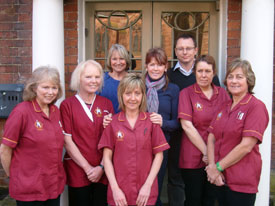A report by the Care Quality Commission warns that adult social care is approaching a “tipping point” – but says co-operation between providers is the key to good and outstanding services.
Services rated good and outstanding were also found to engage with people who used them, their families and carers, as well as the wider community, when designing care plans, facilities and activities.
The study highlights that while most health and adult care services in England are providing people with safe, high-quality and compassionate care, it is unclear whether this position can be sustainable in the future. The research highlights some of the challenges ahead such as a growing ageing population, more people with long-term health conditions and a challenging economic climate.
The commission carries out inspections on a regular basis, and the report is based on inspections and ratings of more than 21,000 services. Its research shows that many services inspected have managed to either improve or maintain quality.
According to the figures, 23% of providers re-inspected were able to improve their ratings from “inadequate” to “good”. Another 53% went from “inadequate” to “requires improvement”. However, 47% were not able to improve their rating from “requires improvement” and in 8% of cases the quality of care had deteriorated to “inadequate”.
David Behan, chief executive of the Care Quality Commission (CQC), said: “What distinguishes many of the good and outstanding services is the way they work with others – hospitals working with GPs; GPs working with social care and all providers working with people who use services.
“Unless the health and social care system finds a better way to work together, I have no doubt that next year there will be more people whose needs aren’t met, less improvement and more deterioration.”
Related … Co-operative Party publishes report on the role of co-ops in social care
Another recent report by the Co-operative Party argues that those who receive, rely and provide care should have a voice and stake in the governance and ownership of services. This, in turn, will improve quality, adds the report.
The Party is calling on the government to establish a ‘right to run’ that puts care workers on the boards of social care providers, and a ‘right to own’ that lets care workers and the wider community take over private services facing closure.

One of the providers recently inspected by CQC is Bridgnorth Home Care Co-operative, which obtained an overall good rating after an inspection in July 2016. The co-op is a domiciliary care agency registered to provide personal care to people of all ages living in their own homes.
The inspection report concluded that: “People and their relatives worked closely with the registered manager and the staff team to ensure they received a responsive service. Outside agencies recognised this and this led to positive working relationships that ensured people received the best possible service.
“People were asked if they were happy with the service provided. There were systems in place to ensure that people’s views and opinions were heard and their wishes acted upon.”
Meanwhile the Local Government Association (LGA) is warning that the elderly and disabled could be facing a potential funding gap of at least £2.6bn. The association represents more than 270 councils in England and Wales, who are calling on the government to “urgently work with councils and providers” to calculate and provide funding to avoid a “large-scale crisis”. LGA estimates that by 2019-2020 a further £1.3bn will be required to deal with the additional pressure brought by an ageing population, inflation and the cost of paying the National Living Wage.
Chairman of the LGA’s Community Wellbeing Board, Cllr Izzi Seccombe, said: “Our analysis shows the sheer scale of the funding crisis we face in social care, both now and in the near future, as well as the damage done from the historic underfunding of adult social care.
“Councils, care providers, charities and the NHS are all united around the need for central government to fully fund adult social care. This is essential if we are to move away from just trying to keep people alive to ensuring they can live independent, fulfilling lives, as well as alleviating the pressure on the NHS.”

